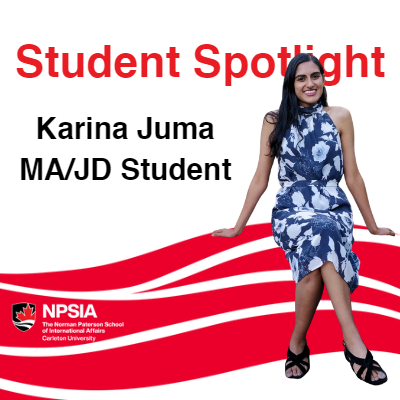Growing up, Karina Juma always knew she wanted to be a lawyer. She loved social studies in high school, and she decided to pursue her undergrad at the University of Ottawa in History and Political Science. But it was her undergrad honors seminar in international relations and a trip to New York for National Model United Nations that solidified her next goal: get an MA/JD from NPSIA.
 “I learned about the JD/MA program from an alumnus of the program, Ali Tejpar. After talking to him about his experiences and the benefits of the program (e.g., distinguishing yourself from other law students, learning from world-renowned policy experts, being part of a large network of professionals in Ottawa and beyond), I was sold on applying.”
“I learned about the JD/MA program from an alumnus of the program, Ali Tejpar. After talking to him about his experiences and the benefits of the program (e.g., distinguishing yourself from other law students, learning from world-renowned policy experts, being part of a large network of professionals in Ottawa and beyond), I was sold on applying.”
She was accepted to the University of Ottawa Law School first, and then received her acceptance to NPSIA a few weeks later into the Health, Displacement and Humanitarian Policy (HDHP) stream. Now in her 2nd year at NPSIA, “what I enjoy most about the JD/MA stream is the personalized feedback and mentorship I received from professors like Lama Mourad during my MA year, as well as meeting other like-minded students in my cohort and in other JD/MA cohorts”.
Karina has also recently published a book called Ordinary People, Extraordinary Actions: Refuge Through Activism at Ottawa’s St. Joe’s Parish. It is based on the 30+ years of activism and support for refugees and newcomers offered by the Refugee Outreach Committee (ROC) at St. Joe’s Parish, located directly across from the University of Ottawa. The book chronicles the history of Canada’s immigration and refugee landscape; a sanctuary case the ROC undertook in 2005; the ROC’s advocacy for the implementation of a refugee appeal division at the Immigration and Refugee Board of Canada (IRB); the Syrian refugee initiative in 2015; and the longevity of the ROC.
offered by the Refugee Outreach Committee (ROC) at St. Joe’s Parish, located directly across from the University of Ottawa. The book chronicles the history of Canada’s immigration and refugee landscape; a sanctuary case the ROC undertook in 2005; the ROC’s advocacy for the implementation of a refugee appeal division at the Immigration and Refugee Board of Canada (IRB); the Syrian refugee initiative in 2015; and the longevity of the ROC.
Her best advice to future students is to connect with current or former JD/MA students to learn about their experiences, what classes they enjoyed, memorable or unique opportunities they had while they were in the program, where the program led them after graduation.